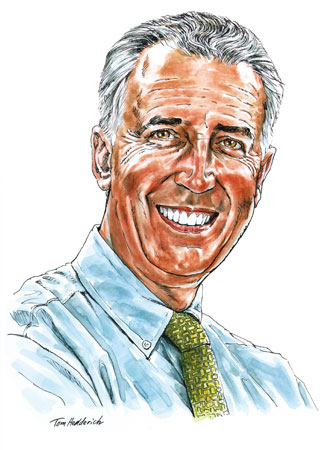Let’s talk about the lives of retired film and TV executives who insist on living in the past, as well as the exciting existences of those who, while no longer on “active” duty, choose to live in the future.
It came casually to my attention that there are two types of retired film and TV executives: Those who like to live in the past and those who want to live in the future. The former enjoy their days at home, nostalgically admiring their numerous awards, medals, and honors, and regularly perusing newspaper clips about their various accomplishments. Occasionally, they even leave their homes to go golfing with friends to reminisce about the “good ’ol days.” The latter, on the other hand, tend to put all their past honors in storage in order to leave the sills empty to make space for future awards and ribbons.
The former stopped attending industry functions to avoid being seen in a different “light” (i.e., not getting the type of attention they were accustomed to in the past). The latter have renewed interest in attending those functions as they want to keep abreast of innovations, meet new people, and approach this new segment of life with the same enthusiasm as they had in the early days of their careers, when everything was new.
Naturally, there is the fear of not been recognized or appreciated for what they once were, but that should be seen as a new challenge, not a hindrance. After all, it was not a hindrance when they were “nobodies.”
Then there is the concern on the part of some people that retired TV execs might be viewed as a burden on “active” executives, and they don’t want to impose. This could be easily overcome by being well organized, alerting conference participant friends well in advance that they’ll be there (without requesting meetings), organizing luncheons for a few friends, being available to trade show organizers to be part of panels, being on juries, or better yet volunteering as trade journal contributors.
As the editor of a trade publication, I, for one, would appreciate a volunteer contributor to participate in and report on the many floor events that time limits do not allow me to attend. In addition, having the “inside” view of a former executive, who, when on “active” duty couldn’t really talk to the press, would be a real plus for any publication.
Trade show organizers would also surely welcome having experts to offer advice on how to improve the show’s efficiency. Traditionally, market organizers are very good at renting exhibition space, but not necessarily at understanding the entertainment in-dustry’s business.
Retired executives returning to “active” duty for even a few days would also mean seeing the industry from a different perspective. It will no longer be a blur as it used to be when they shuttled from place to place without a minute’s rest, not really being able to absorb the activities on hand because they were always thinking about the next meeting or event. Once retired, the executive can finally enjoy the small moments, the people, and the novelties presented.
And for those who tend to use age as an excuse not to remain active, they need only be reminded that at 90 years old Rupert Murdoch is still active at News Corp, as is 92-year-old Bruce Gordon at WIN. And let us not forget that Viacom’s Sumner Redstone worked until 92, and that Metromedia’s John Kluge was 95 when he was forced to retire due to his sudden death. And then, of course, there’s my hero: Norman Horowitz who, following his retirement from MGM, never tired of teaching or learning about this industry.
(By Dom Serafini)
Audio Version (a DV Works service)


Dom, I will be 84 on Jan 20 and am happy to say I am as busy as ever and loving it.
Michael S.
Hi Dom,
Nice commentary. Always enjoy reading your VideoAge My2Cents pieces.
Appreciate your larger point but, you failed to mention a third group of international television “veterans” who are now engaged in new, different activities away from the industry. I for one continue to enjoy teaching and my China healthcare project very much. While I always look forward to seeing my friends and colleagues from the industry, particularly at NATPE, and wish I could see them more often but, feel fortunate to have found other cool things that keep me charged-up.
Talking about NATPE. Hope to see you and so many of my other “veteran” friends in January.
Best wishes for a great Holiday Season.
John
Dom,
I must admit to being a little puzzled about the message you’re trying to convey other than the wonderful (and fortunate health wise) longevity of some executives who choose and are able to stay connected and active in the business This is not the first time you’ve expressed your views on the activities or lack thereof of retired TV executives. One ‘”then” you apparently overlooked is the desire of some to actively explore new opportunities and adventures outside their former area of interest and expertise. This, in fact, does not involve staying “at home”.. There is, after all, a big world out there other than the TV business. Some of these individuals, by the way, do stay connected with friends from the business and keep track of those they may have mentored during their careers. They also try to keep up to date with developments in their former field through news outlets and the many excellent industry publications, one of which is your own VideoAge – thank you for that! Stay well and informative my friend!